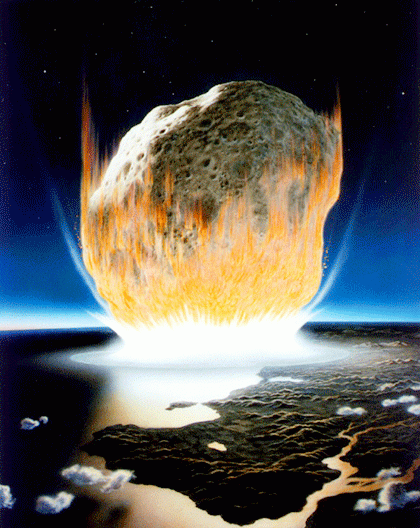Scientists to drill into Mexico's Chicxulub crater where dinosaur-destroying asteroid crashed

In a historic first, scientists are preparing to drill into the massive Chicxulub impact crater off Mexico's Yucatan Peninsula, where an asteroid six miles (9.6km) wide crashed into Earth 66m years ago which is thought to have destroyed half of all life on the planet, including the dinosaurs.
Researchers have long been held at bay by the oil industry but now that they can proceed. However, scientists face enormous obstacles in obtaining core samples from the crater buried under 800m of sediment that has settled over millions of years, reports Vice.
A group led by a team of scientists from the University of Texas, the National University of Mexico and the International Ocean Discovery Program is bankrolling a two-month, $10m (£7m) expedition to drill deep into the crater's "peak ring," which encircles the asteroid's impact site. The researchers plan to begin to drill for core samples by the first of April, and aim to penetrate a mile (1.6km) into the seabed.
They hope to discover details of the impact that created a crater 110 miles (177km) wide, and study the resurgence of life afterward from evidence left in the core samples.
"We expect to see a period of no life initially, and then life returning and getting more diverse through time," geophysicist Sean Gulik of the University of Texas, told CNN. "You can assume that at ground zero of this impact we are dealing with a sterile ocean, and over time life renewed itself. We might learn something for the future."
The Chicxulub impact was incredibly powerful. Scientists believe it may have been a billion times stronger than the atomic bomb dropped on Hiroshima. It unleashed earthquakes and tsunamis and covered the planet with a thick blanket of dust and sediment that blocked out much of the sunlight.
Understanding what happened during the Chicxulub impact can help researchers predict what may happen in the future if another massive asteroid collides with the planet, say scientists.
"We pretty much knew what would happen if another asteroid of this size hit us today — it would not be good — but our work contributes to a larger body of work dedicated to understanding the many geological and ecological processes that happen when such large-magnitude events occur," said Chevron exploration geologist Jason Sanford.
© Copyright IBTimes 2025. All rights reserved.






















